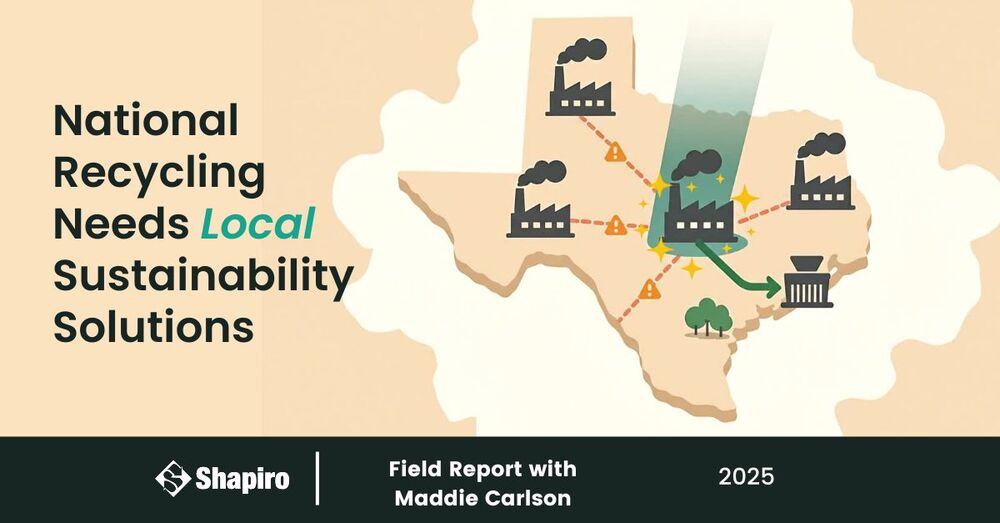Case Studies
Field Reports: National Industrial Recycling Programs Need Local Sustainability Solutions
 Case Studies
Case Studies
September 15, 2025

What if your recycling program is doing the right thing, only in the wrong way?
That’s the question a global manufacturer faced when they examined their environmental reporting program closely. On paper, the program worked. Materials were being shredded and recycled. Data was tracked. Boxes were checked.
But hidden inside the system were inefficiencies that drove up costs, wasted resources, and added unnecessary carbon emissions.
This case study shows how Shapiro helped the client shift from a national one-size-fits-all model to a localized recycling approach, reducing miles, saving money, and strengthening environmental reporting.
The Problem Beneath the Surface
At first, the program looked solid. Scrap and returns were shipped hundreds of miles across Texas to be shredded and recycled. However, the distance created more problems than it solved.
Long-haul trucking meant high transportation emissions.
Using single-use cardboard boxes created extra packaging waste.
The cost of moving material outweighed the benefit of recycling it.
When a new team leader took charge of the program, they asked a hard but important question: Can we get the same results in a smarter way?
A Smarter Approach
Shapiro’s answer was simple but powerful: localize the loop.

Instead of shipping scrap across the state, the client now brings material to Shapiro’s nearby North Texas plant. From there, the material is weighed, consolidated with other compatible scrap, and sent a short distance to an approved shredder.
To cut waste further, Shapiro replaced single-use cardboard containers with durable reusable totes. That change eliminated unnecessary corrugated packaging while making handling easier for employees.
The beauty of the new system? The client’s plant team didn’t have to change a thing. The collection process stayed the same. Only the back-end got smarter.
The Results
The numbers tell the story best. Over the first six months of the new program:

Sustainable Program KPI | Before | After | Improvement |
Transport distance per pickup | 1,264 miles | 132 miles | 90% reduction |
Materials recycled | Undocumented | 351,439 lbs | Large gain |
CO₂ emissions | Higher baseline | 39.82 tons avoided | = 8.66 cars off the road for a year |
Packaging | Cardboard Gaylords | Reusable totes | Reduced waste stream |
Transportation costs | Higher baseline | $19,000 saved | Direct savings |
This simple change produced environmental and operational wins, exactly the balance Shapiro aims for in every sustainability partnership.
Why It Worked
Three reasons stand out:
Local beats long-haul. Same recycling outcomes, fewer miles.
No new burdens. The client’s employees followed the same process, no retraining required.
Proven partners. Shapiro’s experience with other tool manufacturers meant the solution was designed and implemented confidently.
This is an important lesson for companies working across multiple sites: national programs don’t always work best when copied and pasted. Adjusting for local logistics often unlocks the real savings.
Looking Forward
This client plans to expand the localized model to other plants across the United States.
Scaling this approach could multiply the savings and further strengthen corporate sustainability reporting.
Shapiro is ready to help. From recycling services to sustainability reporting, from master alloys to specialized industrial recycling, our focus is to create more intelligent systems that close loops, reduce waste, and deliver measurable value.
What started as a program that looked fine on paper became a clear example of why details matter. The client turned inefficiency into opportunity by asking the right question and partnering with Shapiro.
The lesson is simple. National programs provide direction, but local solutions deliver results.
When you measure carefully, think creatively, and act pragmatically, you build a better system for business and the planet.
Explore how Shapiro designs industrial recycling programs, aligning with operations and sustainability.
